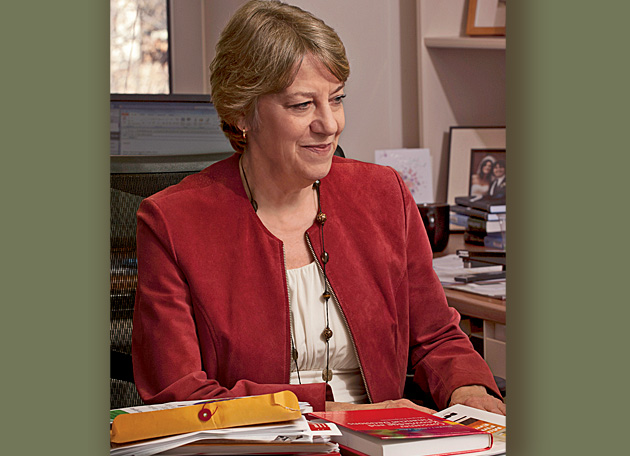
With the aging population rapidly growing worldwide, developing ways to improve quality of life for older adults is an increasingly important issue. An expert on productive aging, Nancy Morrow-Howell, PhD, recently assumed directorship of Washington University’s Harvey A. Friedman Center for Aging. She succeeds John C. Morris, MD, the Harvey A. and Dorismae Hacker Friedman Distinguished Professor of Neurology and director of WUSTL’s Charles F. and Joanne Knight Alzheimer’s Disease Research Center. Morrow-Howell, the Ralph and Muriel Pumphrey Professor of Social Work, hopes to establish more interdisciplinary projects across the university and extend the Center for Aging’s reach around the world.
Washington Magazine: What are your primary goals for the university-wide Center for Aging?
Nancy Morrow-Howell: Population aging is changing the age distribution of most societies around the world, and it affects all aspects of life — the structure of families, the economy, the health-care system, housing and transportation. And every academic discipline plays a role producing knowledge to shape programs and policies for aging societies. The Harvey A. Friedman Center for Aging will provide leadership to promote research, education and community service — areas that enhance the quality of life for older adults, families and communities. The full range of academic disciplines will be involved in these activities, and Washington University will be a local, national and international resource.
WM: How will your internationally known research on productive aging inform your goals?
“The productive aging perspective suggests that engagement is an important part of quality of life for older adults.”
—Nancy Morrow-Howell, PhD
NMH: The productive aging perspective suggests that engagement is an important part of quality of life for older adults. A lot of factors — physical health, cognitive health, mental health, social networks, age-friendly infrastructures in the community, and opportunities to work and volunteer — affect this engagement. The concept of engagement brings together a lot of disciplines. So it’s my hope that I can galvanize more interdisciplinary work on this topic through opportunities at the Friedman Center.
WM: How do you hope to extend the center’s scope?
NMH: By working through the McDonnell Academy, I hope to extend the scope of the Friedman Center internationally. The center will also focus on extending our reach in St. Louis and nationally. There are so many issues important to older adults that demand more academic attention and academic–community partnerships.
WM: Could you provide examples of the research, education or initiatives that are pivotal to the center’s success, and provide a foundation on which to build future impacts?
NMH: Gerontology faculty from psychology, occupational therapy and social work currently teach an interdisciplinary geriatric team course. I hope to create other interdisciplinary classes. The Friedman Center maintains strong relationships with many agencies in St. Louis. I hope to deepen these relationships so that our academic-agency partnerships can make a difference in the development of programs and policies for the older population.
Comments and respectful dialogue are encouraged, but content will be moderated. Please, no personal attacks, obscenity or profanity, selling of commercial products, or endorsements of political candidates or positions. We reserve the right to remove any inappropriate comments. We also cannot address individual medical concerns or provide medical advice in this forum.